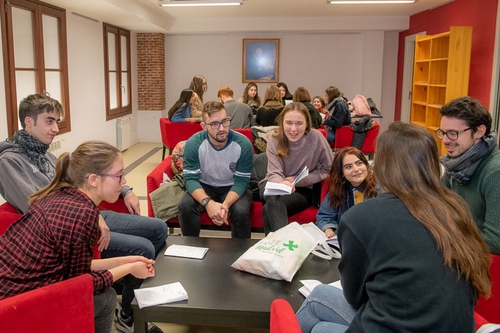Commented Bible Passages
August
Jesus said: When the Son of Man comes in his glory, and all the angels with him, he will sit on his glorious throne. All the nations will be gathered before him, and he will separate the people one from another as a shepherd separates the sheep from the goats. He will put the sheep on his right and the goats on his left. Then the King will say to those on his right, "Come, you who are blessed by my Father; take your inheritance, the kingdom prepared for you since the creation of the world. For I was hungry and you gave me something to eat, I was thirsty and you gave me something to drink, I was a stranger and you invited me in, I needed clothes and you clothed me, I was sick and you looked after me, I was in prison and you came to visit me."Then the righteous will answer him, "Lord, when did we see you hungry and feed you, or thirsty and give you something to drink? When did we see you a stranger and invite you in, or needing clothes and clothe you? When did we see you sick or in prison and go to visit you?" The King will reply, "Truly I tell you, whatever you did for one of the least of these brothers and sisters of mine, you did for me."Then he will say to those on his left, "Depart from me, you who are cursed, into the eternal fire prepared for the devil and his angels. For I was hungry and you gave me nothing to eat, I was thirsty and you gave me nothing to drink, I was a stranger and you did not invite me in, I needed clothes and you did not clothe me, I was sick and in prison and you did not look after me."They also will answer, "Lord, when did we see you hungry or thirsty or a stranger or needing clothes or sick or in prison, and did not help you?" He will reply, "Truly I tell you, whatever you did not do for one of the least of these, you did not do for me." Then they will go away to eternal punishment, but the righteous to eternal life. (Matthew 25:31-46)
The dramatic representations of the Renaissance, as well as the tympana of the great Romanesque churches, have strongly influenced the image we have of the Last Judgment. We see Christ as a stern judge, holding a scale to weigh the good and bad actions of human beings.
If this text incorporates the traditional idea of retribution for one’s acts and the establishment of a new and more just order, it also indicates that this is not primarily a question of merit that can be measured. Both the people on Christ’s right and on his left are equally surprised by what is announced to them and what they are given as their share in things. The entry into communion with Christ is primarily the result of the blessing received from the Father, and good deeds are the sign of this. The people on Christ’s right give the impression they have acted almost spontaneously when confronted by the urgent appeal that needy human beings were for them.
In the Old Testament we see that God rewards kindness shown to the poor (Proverbs 19:17) and that he identifies with his people (Zechariah 2:12). But here, the identification is more universal and more complete: in “the least of his brothers and sisters,” Christ the judge himself is present. Henceforth, the features of Christ can be discerned on the face of every man, woman or child who suffers. As a result, though human suffering is no less real and no less heavy to bear for each person, it is transfigured.
Alleviating the suffering of others and inheriting eternal life is the true destiny of humankind. That is the kingdom “prepared for you,” says Christ to those who are on his right. The others, frozen in an attitude of refusal, are drawn towards what they had not been destined for, where everything they thought they had achieved goes up in smoke. It is by attentiveness to our brothers and sisters who are suffering that we attain our true end, the eternal life that was prepared for us “since the foundation of the world.”
![]() Who are the “least of Christ’s brothers and sisters” around me?
Who are the “least of Christ’s brothers and sisters” around me?
![]() What can I do to encounter them?
What can I do to encounter them?
![]() What do I discover about God by encountering those who suffer?
What do I discover about God by encountering those who suffer?
 TAIZÉ
TAIZÉ